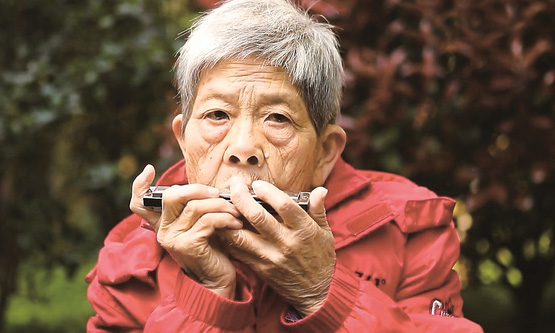Grandchild of Cheng Wenying, a Survivor of the Nanjing Massacre, Shares the Inspiring Life Story of Cheng
As the survivors of the Nanjing Massacre age, their memory of history is in urgent need of being passed down. On February 13, 2023, Zhu Yizhou, grandchild of Cheng Wenying, a survivor of the Nanjing Massacre, shared the inspiring life story of Cheng.
Cheng was born in January 1936. She was the youngest child in the family. Her father, Cheng Changhe did some odd jobs to support the family. In 1937, her father was 40 years old and her mother, 38, was pregnant. That winter, the whole family was forced to leave Nanjing. At first, they followed the crowd and moved towards Anhui Province. But later they changed direction and ran towards Pukou of Nanjing as there were too many refugees running towards Anhui. They were just about to settle in Pukou when the Japanese troops invaded. Cheng and her parents hid in a grove near where they lived. Then her father found their house was set on fire and wanted to save some of their supplies. As soon as he got out of the grove, he was caught by the Japanese soldiers. Unfortunately, her father was shot and fell to the ground. Seeing that, the Japanese soldiers left. Although the shooting didn’t kill her father at that moment, he passed away not long afterthe neighbors helped carry him home. The sudden death of her father meant there would be no source of money for the family. Her mother was so sad that she was in a bad mood. It was then that her younger sister was born. Soon the baby died of pneumonia.
But life had to go on. And they couldn’t be refugees forever. When the situation improved, they went back to Nanjing. The family showed great perseverance in the face of difficulty. Cheng’s mother rented a very small house facing north. During the daytime, she set up a stall on the street and sold cigarettes. At night, she did some handwork. That helped them make ends meet. Later, Cheng’s elder brother, 12, and elder sister, 10, had no choice but to drop out of school and became an apprentice. At that time, Cheng never had a chance to wear new clothes and she could only wear her brother or sister’s old clothes full of patches. After all, she was already lucky enough to have clothes to wear, so it didn’t matter whether they were men’s clothes or women’s clothes. And she only had one pair of shoes. When the shoes got wet on rainy days, she could only wear the wet shoes to go to school the next day. Life was really hard at that time. Later, Cheng’s sister contracted tuberculosis but because the family couldn’t pay for her treatment, she finally died, shortly before the liberation of Nanjing.
Even in such a hard situation, Cheng studied very hard and always got first place in her grade. When she entered middle school, the family could no longer afford her tuition. With the help of the head teacher and the military representative in the local area, Cheng applied for the Class-A scholarship and finished middle school. At that time, China expanded enrollment of students for secondary normal schools. In response to the call, Cheng signed up for an examination and got admitted to Nanjing Municipal Normal School (today’s Nanjing Ninghai Middle School). Because of her good grades, Cheng was later recommended for admission to the Northern Jiangsu Normal College (today’s Yangzhou Teachers Collage as part of Yangzhou University). Upon graduation, she became a teacher in Dachang Middle School. Then she went to Nanjing Kelihua Middle School and worked there until retirement.
“I have the responsibility to speak out what I know. Memory needs to be carried forward, and history cannot be forgotten. We have no right to forgive the Japanese soldiers on behalf of the victims of the Nanjing Massacre,” Cheng always told her grandchild.
Today Cheng is trying her best to make her life worth living. She attends the elderly university and learns how to play the harmonica. She urges her offspring to study hard and cherish the happy life at the moment.

Survivor of the Nanjing Massacre Cheng Wenying learns how to play the harmonica

